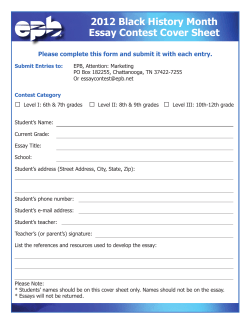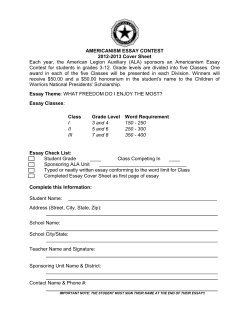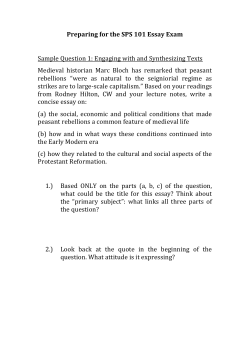
Infor about new courses_ACWR101_Newton
Academic Writing Program (ACWR 101) Spring Semester 2015 Instructor: Paul Newton Office: SOS 128 Phone: 1148 Email: pnewton@ku.edu.tr Office Hours: Monday and Wednesday: 10:00 – 11:15 Course Description: ACWR 101 will lead you to write text-‐based essays in the context of a particular academic theme. In other words, do what we do in an academic community: meaningfully participate in an on-going discourse. As apprentices, you will read texts from various authors to become familiar with what the issues are, how we talk about them, and what positions we might take. Further reading will help you to explore and understand how an argument is effectively constructed. Through summary, paraphrase, and personal response you will develop the skills to formulate your own perspective. This process will include an analytical essay, grounded in one academic text, and for which you will plan, draft and revise your essay. The second assignment will ask you to apply your reading and writing skills to an essay that should synthesize material from two texts. By the end of the course, you should be prepared to move on to your discipline specific ACWR class, in which you should be able to apply the skills they have learned in ACWR 101 and continue to participate in an on-‐going academic discourse, specific to your field. Among others, skills learnt on the course include: • Developing a process based approach to academic writing • Learning to organize and express ideas in a manner appropriate to audience and purpose • Understanding the importance of grammatical accuracy • Becoming familiar with strategies for different kinds of writing • Being introduced to and beginning to accurately use summary, paraphrase & quotation • Being introduced to and beginning to accurately use academic vocabulary • Writing formal papers using basic word processing and proper formatting • A basic knowledge and ability to use MLA documentation and in-‐text citation Course Theme: The topic of this course is the different types of addictions that shape our lives, both the ones we are painfully aware of, and the ones that perhaps we don’t even realize we have. We will examine and discuss some of the possible effects of these addictions, and explore, what, if anything, can be done to treat addiction. Course Requirements & Grading: Two formal academic essays: drafts, revisions, and final drafts 60% Essay One (Summary/Analytical Response Essay): 30% First Draft: 10% Conference to discuss written feedback on First Draft: required Final Draft: (includes grade for 2-draft process and conference) 20% Essay One Description: This 2-‐3 page essay should demonstrate understanding of a specified text and provide a thoughtful response to that text. It will focus on one main text, but may require the inclusion of, or response to, knowledge gleaned from additional course materials. The essay should selectively summarize material from the text, based on the task presented, provide an analytical response, and must refer substantially to the text. Students should refer to page 80 in Rules for Writers for an example Summary and Response paper. The response should apply the controversial ideas in the text to the more accepted views that exist in society, and, accordingly, evaluate the persuasiveness of the text. Essay Two (Analytical Synthesis Essay): 30% Essay Plan: (for peer review): required First Draft: (for conference with verbal feedback): 5% Final Draft: (includes grade for plan and two-draft process) 25% Essay Two Description: In this 3-‐4 page essay, your response should focus on a synthesis and citation of two main texts that argue for opposing positions. Supplemental materials and personal anecdotes may be included but only as approved by instructor. All textual sources used in the essay must be cited. The essay should summarize relevant parts of two texts, and then consider the persuasiveness of the two essays, commenting on the rhetorical style and evaluating the arguments in terms of the task provided. In-class Essay 20% The in-‐class essay is designed to assess the writing/critical thinking skills students have been practicing over the course of the semester. It will ask the students to respond to one main text (in approximately three single-‐spaced handwritten pages) by using both summary and analysis/ argumentation skills. Use of other texts from the course book is optional. The essay will be scheduled for a continuous 2 ½ hour period, which will substitute for one week of class. The reading selected for the essay will consist of one academic text 6-‐10 pages in length. No dictionaries are allowed, but there will be a common dictionary provided by the instructor. Additionally, “Rules for Writers” handbooks cannot be used. Participation and Attendance: 10% Participating in class is more than simply attending class. You are expected to come to class prepared and to contribute to discussions and activities. Consistent active engagement in class will have a positive impact on your participation score; however, texting or talking with your classmates at inappropriate times will have a negative impact on your participation grade. I will keep a secret record of your behaviour in class to use at the end of the course when determining your participation grade. Your participation grade will reflect your level of participation throughout the semester, which means you should make every effort to regularly participate in class. A student who receives an “A” grade for participation typically comes to each class with questions about the readings already in mind. The student raises these issues for other members to consider and discuss, and listens to contrary opinions. An “A” student engages other students in discussion of their ideas, and responds to the comments of others with ideas that move the discussion forward in meaningful ways. The student also participates actively in classroom exercises and activities and provides learning assistance to other students whenever possible. A student who receives a “B” grade for participation has completed all the readings before class, but does not always arrive prepared with questions and reflections. Often a “B” student waits passively for others to raise interesting issues. Nevertheless, “B” students are courteous and articulate in expressing their own views. A “B” student also participates actively in classroom exercise and activities. A “C” student attends class on time, prepares, and listens attentively, but rarely enters into the discussion. This student often participates in classroom exercises and activities. Students with late attendance, inconsistent preparation or participation should not expect more than a “D”. Students who are prepared but who do not respect the contribution of others will receive a “D” at best. Students who are consistently unprepared, make no effort to enter into discussions or classroom activities, or are rude and/or disruptive should expect an “F”. Tests: 10% Towards the end of the course, there will be two multiple-‐choice tests. The first will assess how well you have learned the techniques of effective academic writing that are taught on the course. The second will check your understanding of the longer text that will be used for the in-‐class essay. Each test is worth 5% Grading Criteria: Essays will be graded based on the following criteria: Content: 40% Organization and Development: 30% Grammar and vocabulary 30% Note: All assignments done outside of class must be typed, double spaced, spell checked, completed on time AND be your own work. First Drafts must be printed on A4 paper and brought to class, while Final Drafts must be emailed as an attachment showing changes made using Word’s Track Changes. See Appendix 1 at the back of this coursebook for more details. Required Course Materials: 1. Rules for Writers by Diana Hacker, updated 7th edition, (available at Pandora bookstore) 2. Course Packet – This is available at Copyland (located in the student center). Your course packet will be under your instructor’s name. 3. English/English dictionary 4. Binder 5. Writing Implements: pen or pencil, eraser, notebook 6. Stapler ACWR 101 Course Schedule (Provisional) Classes Activities & Reading Texts Assignments Due Week 1 (1) (2) Syllabus and course objectives/Teacher and student course expectations Part One – The Basics of Academic Writing The Thesis Statement and The Three Parts of a Paragraph Week 2 (3) (4) In-‐class Diagnostic Paraphrase and Summary In-class Diagnostic Week 3 (5) (6) Paraphrase and Summary (continued) Citing Sources Week 4 (7) (8) Part Two -‐ Introduction to the Topic and Essay 1 Discussion of Elizabeth Connell text/Revision of citing sources Week 5 (9) (10) Further Practice of Writing a Analytical Response Essay/ Study of a Model Essay Use of Reporting Verbs/ Assigning of Essay One Week 6 (11) (12) Part Three – Paragraphs to Essay The Three Parts of an Essay Part Four – The Argumentative Essay What is an Argumentative Essay? Thesis Statement and Line of Argument Essay 1: First Draft Due Week 7 (13) (14) Aristotle’s Three Appeals Reading Critically Week 8 (15) (16) Essay 1 conferences Essay 1 conferences Essay 1: Conferences Week 9 SPRING BREAK Essay 1: Final Draft due on Tuesday (by email) Week 10 (17) (18) Evaluating Arguments Evaluating Arguments (continued) Week 11 (19) (20) Writing an Argumentative Essay/ Introduction to Essay 2 Peer Review of Essay 2 Plan Essay 2: Peer Review for Essay 2 Plan Week 12 (21) (22) Test on Effective Academic Writing Documentary on China’s approach to Internet Addiction Essay 2: First Draft Due Week 13 (23) (24) Test on Roger Collier Text (used for the In- class Essay) Discussion of Roger Collier Text and Internet Addiction Week 14 (25) (26) Essay 2 conferences Essay 2 conferences Essay 2: Conferences Week 15 No classes due to the In-‐class Essay Essay 2: Final Draft due on Tuesday (by email) In-Class Essay (One evening this week. Date and time TBA)
© Copyright 2025









